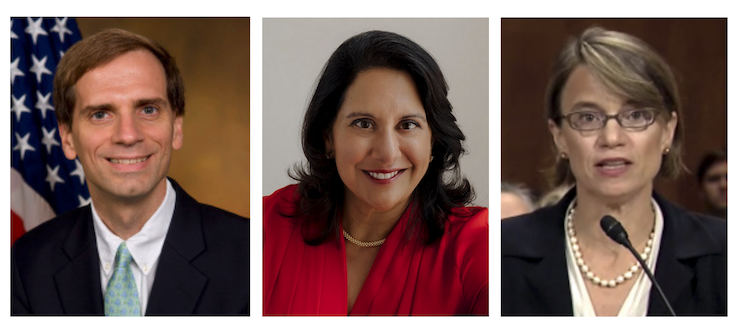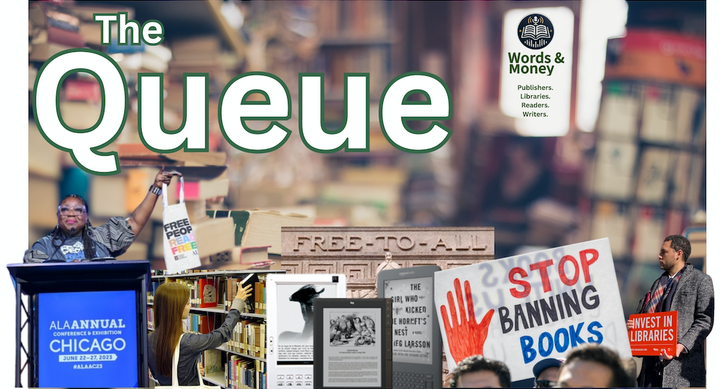Citing Appeals Court Ruling, DOJ Asks Court to Lift Order Blocking IMLS Destruction
Trump Administration lawyers on May 6 filed a motion asking federal judge Richard Leon to reconsider his order temporarily blocking the dismantling of IMLS.

It was two losses in a week in court for the Trump Administration's bid to shutter the IMLS, but have administration lawyers just gotten a potentially big assist from the Washington D.C. Circuit Court of Appeals?
In a May 3 ruling in Widakuswara v. Lake, a divided appeals court panel issued a stay on a recent injunction in a nearly identical case that sought to block the shutdown of the United States Agency for Global Media, finding that, contrary to the district court's initial decision, the government is in fact likely to prevail in the case. And noting the common arguments in the two cases, DOJ lawyers on May 6 petitioned judge Richard Leon to reconsider his May 1 temporary restraining order (TRO) blocking the further destruction of the IMLS.
“Two days after this Court temporarily enjoined Defendants’ efforts… the Court of Appeals stayed an analogous order in a strikingly similar case, reasoning that the Government was ‘likely to succeed on the merits [in that case] because the district court likely lacked subject-matter jurisdiction to enjoin [the agency’s] personnel actions and to compel the agency to restore [grants the agency had canceled],” The DOJ’s motion for reconsideration states. “That dispositive analysis applies here with equal force.”
Arguing that the Widakuswara case “cannot meaningfully be distinguished” from the ALA case, DOJ lawyers asked the court to reconsider its May 1 temporary restraining order.
The motion comes as the parties in the ALA case delivered a status report to judge Richard Leon on May 6. In the brief report, lawyers for the ALA said they intend to supplement the record in the case by May 15, as Leon fully considers their motion for a preliminary injunction, and they consented to the extension of the TRO while the case moves forward.
ALA lawyers also voiced opposition to the DOJ’s motion for reconsideration. “There has been no intervening change of controlling law, and the legal principles upon which the order is based remain sound. Nor has any new evidence come to light,” ALA lawyers assert. “Especially given the irreparable harms Plaintiffs would experience absent the temporary restraining order, justice does not require reconsideration of the order.”
In the report, DOJ lawyers, as expected, did not consent to extending Leon’s TRO, and pointed to its motion for reconsideration, reserving the right to supplement the record with a further briefing by May 15.
Like the IMLS case, Widakuswara v. Lake also stems from Trump’s March 14 executive order. The challenge was brought by a coalition of Voice of America journalists and several networks whose grants have been halted.
In an April 22 opinion and order, judge Royce C. Lamberth, a conservative senior judge appointed by Ronald Reagan, found that the Trump administration’s order and the subsequent actions taken to implement it likely violated both the Administrative Procedures Act and the Constitution, and issued a preliminary injunction.
“In short, the defendants had no method or approach towards shutting down USAGM that this Court can discern. They took immediate and drastic action to slash USAGM, without considering its statutorily or constitutionally required functions as required by the plain language of the EO, and without regard to the harm inflicted on employees, contractors, journalists, and media consumers around the world. It is hard to fathom a more straightforward display of arbitrary and capricious actions than the Defendants’ actions here,” Lamberth concluded.
Lamberth added that the administration’s “unwillingness to expend funds in accordance congressional appropriations laws" stands as "a direct affront to the power of the legislative branch."
In his injunction, Lamberth notably ordered the administration to “take all necessary steps to return USAGM employees and contractors to their status prior to the March 14, 2025 Executive Order,” including the restoration of “all USAGM employees and personal service contractors, who were placed on leave or terminated,” and the disbursement of funds appropriated by Congress.

But in a 2-1 decision on May 3, appeals court judges Gregory G. Katsas and Neomi Rao—both Trump appointees—ordered a stay of Lamberth’s injunction, concluding that the government was, in fact, likely to prevail in the case based on standing and venue questions that have now been rejected by several district courts.
“The government is likely to succeed on the merits because the district court likely lacked subject-matter jurisdiction," the appeals court held, accepting the administration’s arguments that “federal employees may not use the Administrative Procedure Act to challenge agency employment actions” and that “employment disputes with the federal government” belong before other administrative bodies established by Congress.
That finding stands in stark contrast to Lamberth's opinion, as well as to the court's findings in the two cases aimed at saving the IMLS.
In his May 6 ruling in a case brought by 21 states to stop the dismantling of the IMLS, Judge John G. McConnell easily dispatched with the DOJ's defenses, holding that the case at bar is based on “statutory and constitutional violations," explicitly rejecting the argument that the case is contractual in nature and thus the “exclusive jurisdiction" of the Federal Court of Claims. Furthermore, McConnell and Lamberth both found that the mass terminations of grants and staff were were not done reasonably, meeting the APA’s standard precluding “arbitrary and capricious” acts.
And in his May 1 opinion ordering a TRO in ALA v. Sonderling, judge Richard Leon, who now faces a motion for reconsideration, dispatched with the administration’s defenses in a single footnote. “At the outset, the court finds that plaintiffs will very likely be able to establish they they have standing, that this case is ripe, and this court has jurisdiction," Leon wrote.
Meanwhile, the third judge on the appeals court panel, Cornelia T.L. Pillard, an Obama appointee, issued a fiery and lengthy dissent also rejecting the administration's defense.
“The government contends that plaintiffs must treat their wholesale removal from the workplace as if it were an aggregation of individualized employment actions…I would not indulge any such fiction,” Pillard wrote. “Channeling plaintiffs’ claims to administrative bodies designed to adjudicate individual employment or labor disputes would entirely shut off meaningful judicial review of the claims plaintiffs assert,” she added, noting, as did McConnell, that the claims at the heart of the case are constitutional, not contractual.
Whether the appeals court panel's stay is upheld remains an open question, however, as the plaintiffs have now petitioned the full D.C. Circuit Court of Appeals to hear the case en banc.
In concluding her dissent, Pillard lamented that, should the stay remain in force, it could be game over.
“Rather than preserving the relative positions of the parties, this stay all but guarantees that the networks will no longer exist in any meaningful form by the time this case is fully adjudicated,” Pillard concluded. “I regret that networks charged with exemplifying the ideals of free speech, free opinion, and a free press to the world at large are silenced by our own government’s action in disregard of the expressed will of Congress—actions that, as the district court most ably explained, are likely to be found unlawful.”


